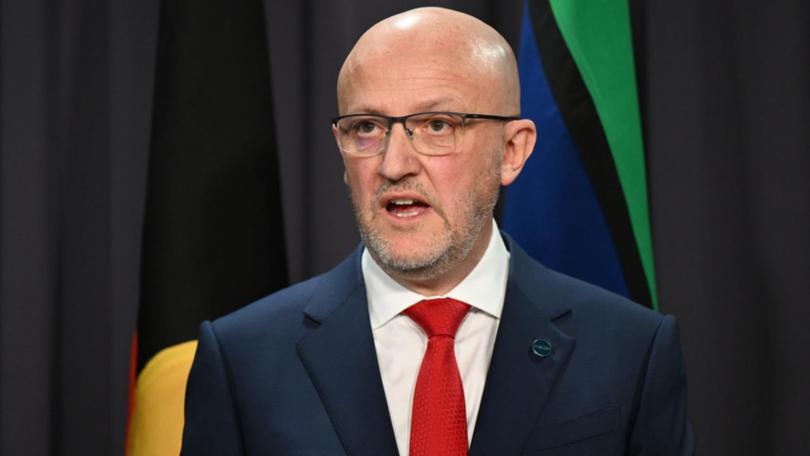Cops warn extremist propaganda for kids is building on platforms including Discord, Telegram and TikTok
Police fear extremists will prey on children, in the same way child sex offenders groom kids online these holidays, and are warning parents.

Police fear extremist groups will prey on children, in the same terrifying way child sex offenders attempt to groom kids online, these holidays and are warning parents to be vigilant when gifting tech this Christmas.
The Australian Federal Police is warning of an increased threat of youth radicalisation and urging parents to play a greater role in supervising their kids’ online activities over the school break.
“The AFP is concerned about the increasing prevalence of young people accessing violent extremist material and propaganda online,” it said.
Sign up to The Nightly's newsletters.
Get the first look at the digital newspaper, curated daily stories and breaking headlines delivered to your inbox.
By continuing you agree to our Terms and Privacy Policy.“The AFP is urging parents to be aware of who their children are communicating with online, what online games they are playing and what they are viewing and accessing online, especially given that many young people will be given tech for Christmas.”
In the last four years the AFP – alongside its Joint Counter Terrorism Team partners – has charged dozens of youth, aged between 17 and 12 years old, with Commonwealth or state-based offences.
Within the JCTT youth caseload, investigators are seeing the same extremist propaganda videos in multiple unrelated investigations and shared across popular platforms such as Discord, Telegram and TikTok.
“Other extremist content being shared online include hate speech and extremist propaganda, along with instruction manuals, misinformation, fake news and far right-wing extremism material,” the AFP said.
“In content reviewed by the JCTT’s, investigators have identified that the violent extremist posts on social media, forums and end-to-end encryption messaging services being shared are mostly visual and depict violence or negative imagery.
“This is a common tactic criminal actors use to heighten an emotional response from their followers and often used to incite group action, violence or terrorism.”
AFP Counter Terrorism and Special Investigation Assistant Commissioner Stephen Nutt said the AFP was concerned that the increased volume of material posted online, and being uploaded and accessed by young people, could have serious consequences for the community.
Assistant Commissioner Nutt added that the AFP is seeing more children accessing extremist material and this increases the risk of those children being radicalised and joining terrorist organisations or engaging in acts of terrorism.
“Family and friends play an incredibly important role in providing support to young people who may be vulnerable to online radicalisation,” he said.
“Police believe extremist groups are targeting vulnerable and young individuals online for radicalisation, as they are more susceptible to being influenced.
“We know that these extremists are preying on children in the same way that child sex offenders attempt to groom children.
“We urge parents and carers to encourage conversation with their children about online safety and to be aware of what their children are doing online including being aware of any signs of radicalisation to help support them.”
The AFP is also urging parents who are buying internet-enabled devices for their children this Christmas to install safety features and talk to their children about how to stay safe online.
AFP Human Exploitation Commander Helen Schneider said the AFP-led Australian Centre to Counter Child Exploitation recorded a spike in reports of offenders preying on children online during holiday periods.
“The latest gadgets are usually at the top of Santa’s wish list, and, unfortunately, anything popular with children can also attract the attention of people who want to harm or exploit them,’’ she said.
“The tech industry does include inbuilt safety features that can restrict the content a child can access and prevent strangers messaging them. There are also apps and external software that can enhance your child’s safety online.
“These safeguards are designed to be user-friendly so even technologically challenged adults can use them.
“However, no amount of technology will ever replace the protection provided by starting an open and honest dialogue with your child about online safety.”
Tips for parents and carers:
Check if the app or game your child is using has a direct message or chat function, and see if they are talking to people they know and trust or people they only know online.
Consider disabling the chat if not necessary for the game or app. If this isn’t possible, ensure your child knows to keep the chat about the game only and to avoid answering any personal questions.
Some apps or games have privacy settings that can be changed to limit who can contact your child. We recommend implementing this where possible, however keep in mind these can sometimes be changed, so we also suggest a regular privacy ‘check-up’ to make sure these are still in place.
Encourage critical thinking skills with your child and explain to them that not everyone online is who they say they are.
Someone asking your child to move to another platform or to add them as a ‘friend’ on another platform might be a sign that something isn’t right. Keep an eye out for suspicious activity and know how to block and report them.
Signs that a child may be susceptible to radicalisation include:
Distancing themselves from their usual friends and family members;
An increase in the extremist nature of their rhetoric or propaganda they propagate;
Your child using hateful or emotionally-charged language;
Developing a fixation on conspiracy theories or contentious social issues;
Displaying extreme reaction to certain news or politics, or
Spending increasing amounts of time in fringe forums on the internet.
SEEK HELP:
If you believe your child is in immediate danger, call Triple Zero (000) or local police (131 444).
If you suspect your child is being radicalised online or in person, call the National Security Hotline on 1800 123 400.
For anonymous reporting, visit the Crime Stoppers website or call the toll free number 1800 333 000.

